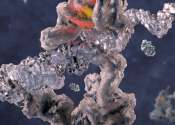Origin of life in membraneless protocells
How life arose from non-living chemicals more than 3.5 billion years ago on Earth is a still-unanswered question. The RNA world hypothesis assumes that RNA biomolecules were key players during this time as they carry genetic ...









